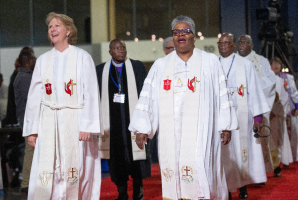How to Share the Gospel With LGBT People (Part 1)

It is very important to know how to properly share the Gospel with those who would consider themselves LGBT. As Christians living in our current culture, we have a responsibility to share the Gospel with everyone, regardless of how they define their sexual identity. This article will be part one of a two-part teaching on how to share the Gospel with people who consider themselves LGBT.
Many Christians feel intimidated about sharing with someone that is dealing with gender and sexual identity issues. This is often because of the prominent mindset pushed within the culture and media which says that those that disagree with gay marriage and believe in a Biblical view of sexuality, and gender, are haters.
Just because the culture has embraced an un-Biblical mindset about sexuality does not mean that we as Christians can forsake our responsibility to share the Gospel with those who are LGBT. More than ever, we need to know how to share the Gospel with everyone. In the following paragraphs, I will be sharing the method and strategy that has best worked for me in ministry.
I run an outreach and evangelism ministry where I, and those who work with me, do a large amount of street ministry and evangelistic outreaches. I have ministered to more LGBT people than the "average" Christian. The way the Holy Spirit has led me to minister in these situations has been to deal with the individual's total identity rather than dealing only with the specific sexual sin.
If you have trouble knowing how to share the Gospel with someone who considers themselves LGBT, what I am about to share below will greatly help you.
It is important to understand that many people who are LGBT have automatic defenses up against Christians. Some of this is because they may have come across harshly condemning Christians throughout their lives. It can also be because they have a root of rebellion against God and heavy demonic bondage. And still, other times it is because the media often demonizes Christian morality and beliefs in a way that is "over-the-top" and inaccurate. It is also possible that there are various mixtures of all three of these things inside each individual.
When I am sharing the Gospel with someone who is LGBT, they will often throw their sexuality to the forefront of the conversation. Rather than arguing with them specifically about the topic of homosexuality, I will begin to talk with them about "identity." When ministering, it is easy to get caught in mental back-and-forths and get lost arguing. The Gospel primarily deals with the heart. It is good to avoid fruitless arguments of the mind.
The first question I will ask the person I am sharing with is how long they have identified themselves the way they currently do. It is an important question to understand where they are coming from. Is it a recent decision? Is it a decision that has been embraced for decades? The answer enables me to better know how to approach the situation.
From there I will ask him or her, if there have been any events in their life that were very wounding. Sometimes, they will share that they experienced sexual abuse as a child, other times they will share about a horrible relationship with a parent, or even a former spouse. Sometimes, they will not want to answer, or they will say that they have not experienced any trauma. It is important to not be timid when asking questions. Many times, people are willing to talk about their hurt and wounding, especially if they sense the love of God when being talked to.
This is not always the case, but based on my many experiences, there is normally deep wounding in the lives of those who are LGBT. Surprisingly, they are also normally willing to share about it. They often don't believe that the wounding led to their choice to adopt a different sexual identity, but nevertheless, I have seen people share transparently about their lives with me even though they only met me minutes earlier.
Past wounding, however, does not give anyone a justifiable excuse before God for their sin. God in no way gives anyone a "free pass" for sin. Romans 1:20 is clear that all mankind is "without excuse."
The information that is shared in conversation does help me better know how to share the Gospel with them. I was once sharing the Gospel with a young teenage girl who recently decided to become a lesbian. She was with her girlfriend as I shared with the two of them about Christ. She opened up to me and told me that she had been raped two years earlier, and she hinted at there having been other issues of sexual abuse from men throughout her life. She said that she no longer trusted men. Knowing about the wounding in her life helped me better understand the root cause of the problem and minister to her.
All people need forgiveness for all their sins, regardless of what their primary sinful bondage might be. After dealing with the wounding the person may have experienced that has led them to make their current choices, it is important to deal with the truth that each person in the world has a sinful identity.
By dealing with their identity as a sinner in need of a savior, rather than just the specific sexual sin, I bypass the confusion that can be raised to their minds. For example, if I only deal with the one issue of their sexual sin, it is easy for them to think, "Oh, he is only telling me about Jesus because I am LGBT." No, the truth is that even if they did not struggle with sexual identity issues, they would be just as in need of salvation and forgiveness through Jesus Christ as any other person. In conversation, I will share this, and it normally results in the person's defenses and walls being lowered enough to continue the conversation further.
From there, I will discuss with them about other sins like lying, stealing, cheating, hating, lusting, and then explain to them the way in which all of these sins violate God's perfect standard of morality. I will tell them how we are accountable to God for all of our sin, that our sin separates us from God, and that our sin places us under His judgment.
This helps me further explain to them that each human in this world has an identity issue. This issue is that we are all sinners. We have fallen and rebelled against God and it leads to horrible consequences in our lives and the lives of others. And, one of the worst effects of sin is its ability to blind perceptions. I will explain that Jesus came to set us free from our sins and set us free from an identity that He never intended for us, and that He did this by taking our sin and the penalty for our sin on the cross. All of this lays a strong foundation for what will be discussed in part two.
In part two, I will further explain specific examples that better help us as believers convey the truth that each person has an identity issue that only repenting and believing the Gospel can resolve.




























